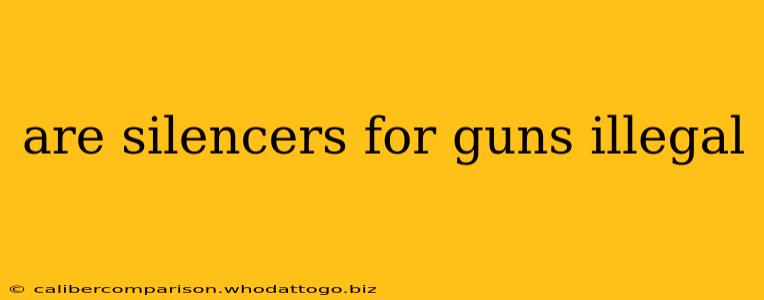Are Silencers for Guns Illegal? A Comprehensive Guide to US Federal and State Laws
The legality of firearm silencers, often mistakenly called "suppressors," is a complex issue in the United States, varying significantly between states and subject to stringent federal regulations. Simply put, silencers are not entirely illegal, but their ownership and use are heavily regulated.
This guide will break down the intricacies of silencer legality, offering clarity on federal laws and highlighting the importance of understanding your specific state's regulations.
Federal Regulations Governing Silencers
At the federal level, silencers are regulated under the National Firearms Act (NFA) of 1934. This act classifies silencers as "firearm silencers" and subjects them to strict regulations, including:
- Registration: All silencers must be registered with the Bureau of Alcohol, Tobacco, Firearms and Explosives (ATF). This involves a thorough background check and a lengthy application process.
- Tax Stamp: A significant tax stamp fee is required for the registration of each silencer.
- Serial Numbering: Each silencer must have a unique serial number.
- Transfer Restrictions: Transferring ownership of a registered silencer requires additional ATF paperwork and background checks.
Failure to comply with these federal regulations can result in severe penalties, including hefty fines and imprisonment.
State Laws and Regulations: A Patchwork of Restrictions
While federal law provides a baseline, individual states have the authority to enact their own regulations concerning silencers. This creates a complex patchwork of laws across the country. Some states may:
- Ban silencers outright: Certain states prohibit the possession or use of silencers entirely.
- Impose stricter regulations than federal law: Some states may add additional requirements beyond those mandated by the NFA, such as stricter background checks or licensing requirements.
- Have no additional restrictions beyond federal law: Other states may simply align with the federal regulations without adding any further limitations.
It is crucial to research the specific laws of your state before purchasing or possessing a silencer. Failure to comply with state regulations can lead to severe legal consequences, regardless of compliance with federal law.
Misconceptions about Silencers
One common misconception is that silencers make firearms completely silent. In reality, they significantly reduce the sound of a gunshot, but they do not eliminate it entirely. The level of sound reduction depends on various factors, including the firearm, ammunition, and the silencer's design.
The Importance of Legal Compliance
The legal landscape surrounding silencers is intricate. Due to the potential for severe penalties associated with non-compliance, it is essential to conduct thorough research and understand both federal and state laws before considering purchasing or possessing a silencer. Consulting with legal professionals specializing in firearms law is highly recommended.
Disclaimer: This information is for educational purposes only and should not be considered legal advice. Always consult with legal professionals and relevant authorities for guidance on specific legal matters related to firearm silencers in your jurisdiction. This information is not intended to encourage or discourage the ownership or use of silencers.

